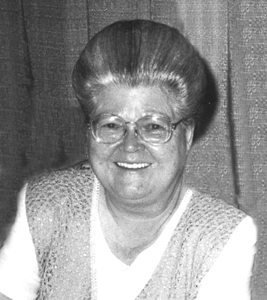NEWS FROM THE HILLS
 Stifling summer heat continues to smother our hills while each foray outside is like stepping into a sauna. However, the garden flourishes in spite of the heat, with occasional thundershowers refreshing the crops. The country housewife forges ahead as the vegetables mature; canning, pickling, and preserving.
Stifling summer heat continues to smother our hills while each foray outside is like stepping into a sauna. However, the garden flourishes in spite of the heat, with occasional thundershowers refreshing the crops. The country housewife forges ahead as the vegetables mature; canning, pickling, and preserving.
The air conditioner is a blessing during these searing-hot days, although it is overworked to combat the heat from boiling canners on the kitchen stove. It makes a person wonder how in the world our mothers and grandmothers coped without the air conditioner, or even a fan in some instances, working over a hot woodstove to put up their summer garden.
There is great satisfaction in seeing the fruit of your labor. From the tiny seeds and plants placed in the soil in the spring, to the ripe, red tomatoes and yellow ears of corn, to the gleaming jars of vegetables on the cellar shelf, it is gratifying to see the work of your hands. We planted and cultivated, but God gave the increase.
Farm children who grow up helping with the crops and seeing the labor involved in harvesting and preserving the produce know intimately where their food comes from. Those youngsters who spend their childhood growing up in urban areas sometimes have no idea where their food originates. I expect the majority of them thinks that all their food comes from the supermarket shelves.
I remember one summer when our young cousin Kay (Uncle Myles’ and Aunt Lucille’s daughter) came to spend a few days with us. She wasn’t very old, probably seven or eight, and was especially fond of macaroni and cheese. Daddy told her one day to go out in the garden and pick some macaroni and we’d cook it for supper.
She dutifully made a trip to the garden, and stayed for quite a bit. She came back in to report in disappointment “that she couldn’t find any!” We must have teased her quite a bit. We rode the Greyhound bus here from her home in South Charleston, and when we passed Cobb Station, she asked in interest, “What is that?”
I replied that it was Cobb Station, and that was where they put corn on the cobs. Kay is 65 years old now, and I expect that she has found out the difference. Even county children sometimes get confused. My great-granddaughter, Adrianna, was watching me fry an egg recently, and as I cracked the shell, she cried in alarm, “Don’t, Mommaw—there might be a chicken in that!” I had some explaining to do.
Sometimes I think we adults take for granted the source of our food. We casually pick up a sack of corn meal mix at the grocery store, forgetting how our grandparents procured theirs. I can remember Daddy tossing a feed sack full of shelled field corn across our horse Topsy’s back, and taking it to Jim Wayne’s at Valley Fork where he operated a grist mill.
Norman Nottingham of Duck wrote some time back about the grist mill that his grandfather, Anise Mollohan, operated many years ago at Servia. He wrote, “This was quite a big operation powered by a huge steam boiler fueled by coal and shavings from the planing mill (powered by the same boiler.)”
Mr. Nottingham is 78 years old now, and he says as a small boy this was quite a frightening place with all the grinding, shaking, big long belts flopping and other scary noises. He continued, “One thing I distinctly remember was the big box where he kept wheat bran. He didn’t mind us lifting the lid and grabbing a handful of the tasty, fresh bran.
“The mill had a big steam whistle that Grandpa could blow to signal to his son Clifford who lived about a mile away when he was needed at the mill. One cold winter day my mother Darlie led our big team of horses to a water hole in the creek close to the mill. While standing there with the halter straps wrapped around her hands, Grandpa, not knowing she was there, blew the whistle, scaring the horses and causing them to jerk Mom headlong into the icy water. She was expecting a baby, but fortunately suffered no ill effects. Grandpa also ran a blacksmith shop beside the mill. I would love to see photos of that old mill.”
The blacksmith shop is another thing that is almost a relic of the past. Criss’ father, George Bragg, was a blacksmith and shod most of the horses in that area. (I am not sure that “shod” is a proper term—it may be dialect.) While we are on that subject, Mr. Nottingham inquires if anyone knows where “flying off the handle” originated.
That calls to mind one of my favorite poems:
THE VILLAGE BLACKSMITH
By Henry Wadsworth Longfellow
Under a spreading chestnut tree
The village smithy stands;
The smith, a mighty man is he,
With large and sinewy hands;
And the muscles of his brawny arms
Are strong as iron bands.
His hair is crisp, and black, and long,
His face is like the tan;
His brow is wet with honest sweat,
He earns whate’er he can,
And looks the whole world in the face,
For he owes not any man.
Week in, week out, from morn till night
You can hear his bellows blow;
You can hear him swing his heavy sledge,
With measured beat and slow,
Like a sexton ringing the village bell,
When the evening sun is low.
And children coming home from school
Look in at the open door;
They love to see the flaming forge,
And hear the bellows roar,
And catch the burning sparks that fly
Like chaff from a threshing-floor.
He goes on Sunday to the church,
And sits among his boys;
He hears the parson pray and preach,
He hears his daughter’s voice,
Singing in the village choir,
And it makes his heart rejoice.
It sounds to him like her mother’s voice.
Singing in Paradise!
He needs must think of her once more
How in the grave she lies;
And with his hard, rough hand he wipes
A tear out of his eyes.
Toiling,–rejoicing,–sorrowing,
Onward through life he goes;
Each morning sees some task begin,
Each evening sees it close.
Something attempted, something done,
Has earned a night’s repose.
Thanks, thanks to thee, my worthy friend,
For the lesson thou hast taught!
Thus at the flaming forge of life
Our fortunes must be wrought;
Thus on its sounding anvil shaped
Each burning deed and thought.
- DAD’S LOVE - July 3, 2020
- HUNTING FOR “MERKLES” - April 24, 2020
- THE SEASON OF GOLD – News From The Hills - November 8, 2019


